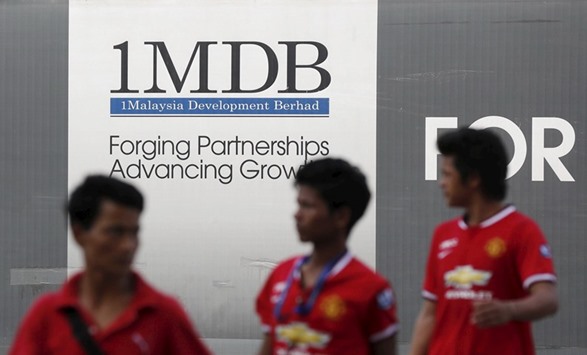Troubled Malaysian state investment fund 1MDB said yesterday it had defaulted on $1.75bn in company bonds after missing an interest payment, heightening fears of a market-rattling bailout of the scandal-hit company.
The fund, founded in 2009 by Prime Minister Najib Razak, is teetering on the brink of collapse amid multiple investigations around the world into allegations that billions were looted from it.
1MDB, or 1Malaysia Development Berhad, released a statement saying it was “now in default” on the bonds after missing the $50mn interest payment. It blamed a dispute with Abu Dhabi’s sovereign wealth fund, the International Petroleum Investment Co (IPIC).
IPIC, the bonds’ co-guarantor, earlier this month accused 1MDB of failing to pay it back a $1bn loan, the latest indication of financial chaos at the state-owned fund.
1MDB insists it repaid the loan.
But IPIC says the money went to a company with which it has no relationship – fuelling accusations the money was diverted. It is refusing to guarantee the bonds until the loan is repaid.
The Malaysian fund, whose advisory board is chaired by Najib, said the failed interest payment triggered “cross-defaults” on two other bond issues.
Malaysia’s main stock index fell more than 1% and its currency also weakened following the announcement.
1MDB sought to reassure skittish investors, say it “will meet all of its other existing financial obligations and has ample liquidity to do so”.
1MDB, which ran up more than $11bn in debt in a series of much-questioned investments, has steadfastly denied money was stolen or that it was in financial trouble.
But those claims have been severely tested lately.
Earlier this month a Malaysian parliamentary committee said at least $4.2bn in questionable overseas money transfers were made by 1MDB.
Tony Pua, a prominent opposition parliamentarian, said the bond defaults indicates “1MDB’s house of cards has all but collapsed” and that Malaysian taxpayers would bear the cost.
“This is another obvious admission that 1MDB will be relying entirely on the Malaysian government to bail out 1MDB in its burgeoning debt crisis,” he said. Najib was plunged into the 1MDB crisis last year when the Wall Street Journal revealed that $681mn was transferred to his personal bank accounts in 2013.
He claims that money was a gift from the Saudi royal family, most of which he returned. A Saudi official recently said that was true, but only after weeks of silence that cast doubt on the claim.
In a series of more recent investigative reports, however, the newspaper said Malaysian investigation documents indicate more than $1bn in 1MDB-linked money had been funnelled to Najib.
Najib and 1MDB vehemently deny that. Analysts said the bond defaults were likely to keep investors on edge.
“Investors are pulling back now and it’s a knee-jerk reaction,” Geoffrey Ng, director at Fortress Capital Asset Management, told Bloomberg News.
“It presents a credit risk issue to foreign investors and it causes uncertainty in terms of the outlook for Malaysian government credit ratings.”
Najib has faced mounting calls to resign over the year-long scandal but he has tightened his grip on the ruling party and thwarted domestic investigations. His position is not seen as under imminent threat.

Pedestrians walk past a 1MDB billboard in Kuala Lumpur. The fund yesterday released a statement saying it was ‘now in default’ on the bonds after missing the $50mn interest payment.
